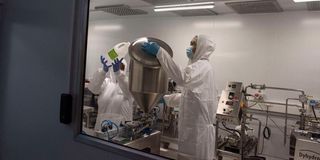Africa’s first Covid vaccine to be ready in two years

Employees at the Afrigen biotechnology company in Cape Town on October 5, 2021. A South African biotech consortium will make Africa’s first homegrown mRNA jab against Covid-19.
What you need to know:
- The vaccine candidate, processed using messenger RNA (mRNA) technology, will be the first to be designed, developed and produced at a laboratory on the continent.
- The lack of soup-to-nuts manufacturers is the major reason low- and middle-income countries were all boxed out of buying Covid-19 vaccines.
- Africa produces one per cent of the vaccines it needs, yet uses 25 per cent of all vaccines produced globally.
A Covid-19 vaccine developed in Africa for Africans will be approved in two years, with human trials beginning early next year.
The vaccine candidate, processed using messenger RNA (mRNA) technology, will be the first to be designed, developed and produced at a laboratory on the continent, thanks to the hub at Afrigen Biologics and Vaccines, a biotechnology company that may end overreliance on developing countries.
The lack of soup-to-nuts manufacturers is the major reason low- and middle-income countries were all boxed out of buying Covid-19 vaccines.
Globally, the concentration of vaccine production in a few high-income countries has led to vast inequities in access, with more than 80 per cent of the African population yet to receive a single dose.
Africa produces one per cent of the vaccines it needs, yet uses 25 per cent of all vaccines produced globally.
The failure to globalise the vaccine ecosystem to include production in a greater number of poor countries amplified global inequities in access.
Without the establishment of a manufacturing hub that produces at least 50 per cent of African vaccines, there will never be research and development capability, no pandemic preparedness with the next pandemic sited in the same boat of not having access to vaccines, not having vaccine equity, not having health equity as the continent is incapable of producing its own vaccines.
“We have to build this sector at all costs. this is our breakthrough as a continent and it’s now,” Prof Petro Terblanche, Afrigen's managing director, said in his opening remarks when the journalists visited the facility early this month in Cape Town, South Africa.
Disease outbreaks
A number of disease outbreaks have been reported on the continent, with the recent ones being Ebola in Uganda, Covid-19, yellow fever, swine flu, polio, measles and Monkeypox.
“If African countries come together and make Afrigen mRNA vaccine hub, then the continent will have its first vaccine manufacturing hub, making it the first mRNA vaccine ever in Africa to receive approval by the World Health Organisation,” Prof Terblanche said.
The majority of mRNA vaccine trials have been going on in high-income countries with minimal interest in the continent. Only two mRNA vaccines have so far been approved for Covid-19, Moderna, and the other from Pfizer and BioNTech.
The messenger RNA teaches cells how to make a protein that triggers an immune response in one’s body, rather than putting a weakened or inactivated germ into the body.
With the lesson learnt post-Covid-19 and the need for Africa to produce its own vaccine, the WHO in April last year made a call for expression of interest to countries to put in proposals to scale up production and access.
Afrigen hub then partnered with Biovac and the Medical Research Council. The hub was to develop the technology and transfer the first spoke to Biovac, while the council was to develop a pipeline of the next-generation vaccines.
“We saw this as an opportunity to establish and develop vaccines for neglected diseases in low-income countries that are of no priority to high-income countries because either the market is smaller and return on investment is not there,” says Prof Terblanche.
About 28 countries declared their interest and on June 21, the WHO announced that the South African consortium had been selected to establish the first Covid-19 mRNA vaccine technology transfer hub in Africa.
Dr Lul Riek, Africa Centre for Disease Control regional coordinator, said on most occasions, the continent depends on wealthy countries to take care of its health matters and that has undermined the outcome.
Ms Winnie Byanyima, executive director of UNAIDS and co-chair of the People’s Vaccine Alliance, said: “...I keep saying that to fight and end Aids, to fight other pandemics, we must confront the rules that are rigged against ordinary people from poor countries. We must fight.”





